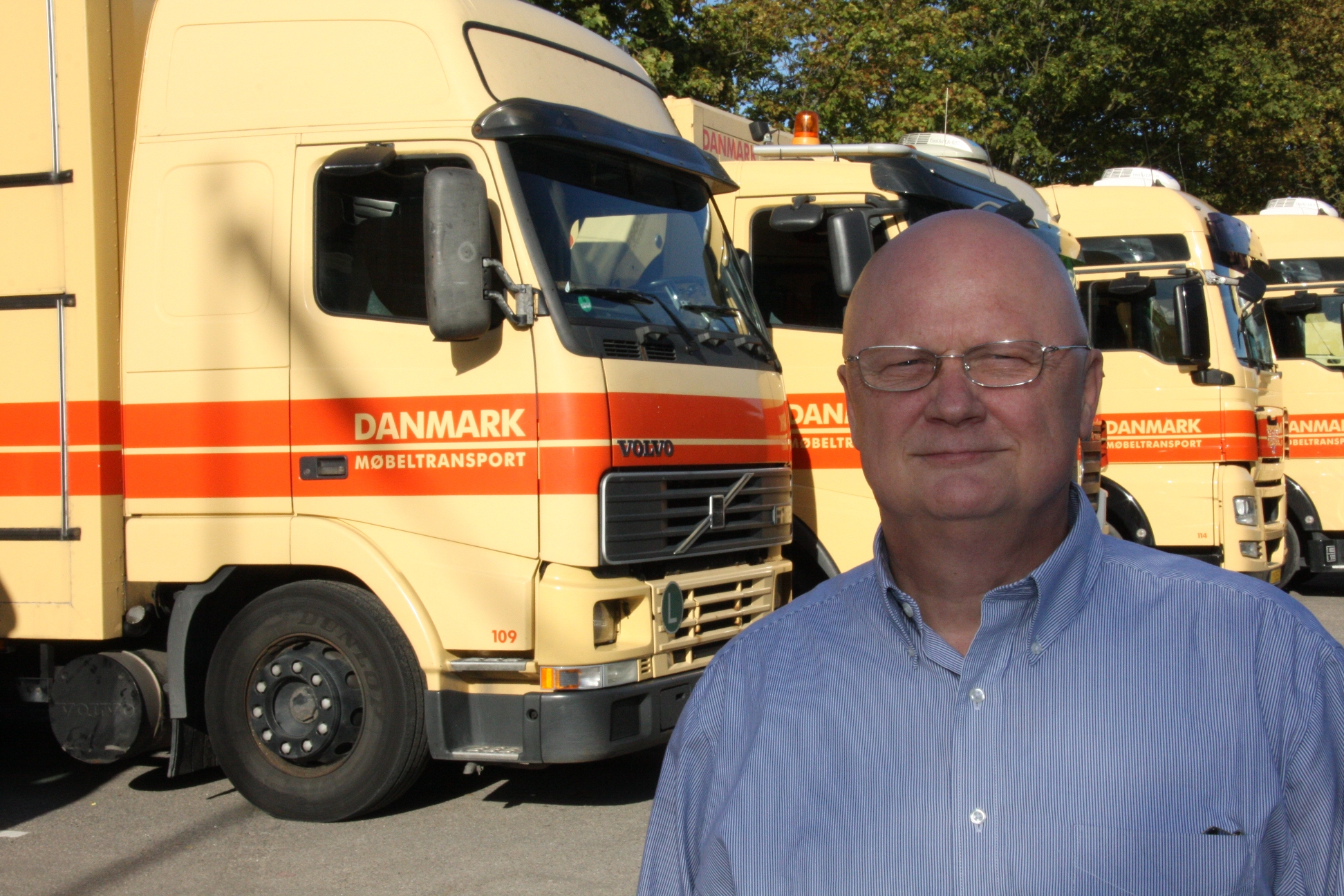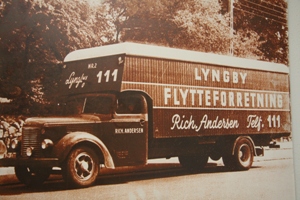An interview with Gunnar Moeskjaer of Mobeltransport Danmark

Mobeltransport Danmark is the largest moving company in Denmark, a member of the Danish Moving Federation, the only member of OMNI in the country and one of only a handful of FIDI Denmark members. During a recent visit to Copenhagen, Steve Jordan, dropped by for a chat with the company’s head of Group International Business, Gunnar Moeskjaer.
Drive up outside the Mobeltransport Danmark building in Copenhagen and its hard not to be impressed. It’s a large, modern building in a bustling industrial area close to the highway network and yet within reach of the bright lights of the city. It’s the ideal spot.
History
 Niels Bach was the 3rd generation owner of the Aarhus-based Bach Møbeltransport company. In 1996 he merged his company with Salicath Express, one of Copenhagen’s old established moving companies that was founded in 1878, to form Bach & Salicath. In 2001 Niels bought Salicath’s part of the business and in 2002 went on to acquire Møbeltransport Danmark to create the largest moving company in Denmark for both domestic and international. The company also owns a separate brand for domestic moving – Lyngby Flytteforretning acquired in 2007 - which is very well respected in the city and with which it liveries some of its vehicles. Scan Transport in Southern Spain was also purchased in 2007 and is today an important part in the company’s European Logistic set up. Today the company employs around 200 people in Denmark, has a turnover of around 200 million Krona (£22million), and now embraces relocation, and office moving including space planning and project management.
Niels Bach was the 3rd generation owner of the Aarhus-based Bach Møbeltransport company. In 1996 he merged his company with Salicath Express, one of Copenhagen’s old established moving companies that was founded in 1878, to form Bach & Salicath. In 2001 Niels bought Salicath’s part of the business and in 2002 went on to acquire Møbeltransport Danmark to create the largest moving company in Denmark for both domestic and international. The company also owns a separate brand for domestic moving – Lyngby Flytteforretning acquired in 2007 - which is very well respected in the city and with which it liveries some of its vehicles. Scan Transport in Southern Spain was also purchased in 2007 and is today an important part in the company’s European Logistic set up. Today the company employs around 200 people in Denmark, has a turnover of around 200 million Krona (£22million), and now embraces relocation, and office moving including space planning and project management.
Gunnar explained that the international market in Denmark was quite small with only a few big names. The company has made a particular name for itself in the medical sector. Mobeltransport Danmark suffered, just as did everyone else, in the recession. However in 2007 it signed a four-year contract with the foreign ministry which helped it through the difficult years. The contract was lost to Crown earlier this year. “Our whole society has had to save money and the government is the same,” said Gunnar.
There then ensued a long conversation about quality, pricing, procurement, etc. – one that has been had in every boardroom worldwide. Although Gunnar believes that his company’s record for quality speaks for itself, he admits that he too succumbed to cutting prices to secure the contract. “I think we are all our own worst enemies. We knew it would be tight so we dived too.” Of course the trick is knowing just how far you can dive: cutting too far is usually worse, long term, than not cutting enough.
Quality
When it comes to quality, Gunnar’s company ticks all the boxes on the RFP forms. It also has FIDI/FAIM, has recently achieved ISO 14001, and in October announced that it has signed the United Nation Global Compact reaffirming its long tradition of working with corporate responsibility. But to Gunnar, quality is not a box-ticking exercise. “We spend a lot of time building relationships,” he said, although he acknowledges that relationships in corporate moving are not always easy to make as decision makers are often kept well insulated from suppliers. “We try to get people to visit us. We have pretty good facilities and people are always impressed when they come round. When customers have been here they realise we are not just like ordinary moving companies; then they tend to treat us more as equals rather than suppliers to be pushed around.”
Relocation
The international business is, today, heavily influenced by relo. The company was one of the first to embrace relocation in 1998 under the brand name of ‘House of Relocation’. “In the early days we had to convince people that they needed it,” said Gunnar. “It was very hard work.” But, although the Internet appears to enable assignees to do a lot of the work that a relo company would offer – home and school search, for example – Gunnar feels that the average corporate assignee doesn’t have the necessary local knowledge nor the time, even if he is paying for the service through an allowance. “Some of the people don’t even have time to read the documentation we send them,” he explained. “I have even had people sign delivery documentation before the crew unloads and go off to work.” Not that the Internet isn’t a threat. Gunnar said that although people might not have the time to do the work themselves, they at least have some idea of how they could do it using the Internet so it puts pressure on the service the relo companies offer.
Since 2008 the company has been increasingly handling global relocation management services all over the world for Danish corporate accounts, a development that the company is aggressively pushing, among others by investing in a new integrated relocation and moving IT system with all the bells and whistles the corporate market requires today.
Name change to Aspire
The company recently opened an office in Stockholm Sweden called Aspire Mobility AB. And in January next year all the international services of the company will be rebranded to become Aspire Mobility. “The problem is that we provide a global service and our existing company name limits us to Denmark,” explained Gunnar. “Also, the name is a bit difficult to pronounce, especially for non-Danish speakers. The word ‘mobility’ also describes what we do better.”
The domestic services in Denmark as well as the Fine Art Logistic Division will however maintain the Møbeltransport Danmark name, which also will continue to be the legal entity of the company.
European coverage
When the company in 2007 purchased Scan Transport in Malaga, Spain, the idea was to use the regular flow of private work from Denmark, through Europe to Spain to provide a regular service. This, in turn, allows the company to offer a first-class corporate moving service to and from the commercial centres of Madrid and Barcelona for its corporate clients. “We run it like a shipping line. We keep the vehicles on the road and fly the drivers out to join them. In the off season we run a very effective groupage service for Danish and Spanish movers through Europe.”
Culture
 Which brings me back to the reception. The artwork which greets the visitor, a tiled picture, an ornamental clock and statues, have all been presented to the company by the staff to commemorate special anniversaries: This is a company that looks after its staff. Walk upstairs to the main office to see the awards from OMNI, FIDI, Graebel and others: This company is proud of its record. A little further into the communal area to find a whole wall festooned with profiles of long-serving employees – one has been with the company for 65 years: This company knows a thing or two about staff retention.
Which brings me back to the reception. The artwork which greets the visitor, a tiled picture, an ornamental clock and statues, have all been presented to the company by the staff to commemorate special anniversaries: This is a company that looks after its staff. Walk upstairs to the main office to see the awards from OMNI, FIDI, Graebel and others: This company is proud of its record. A little further into the communal area to find a whole wall festooned with profiles of long-serving employees – one has been with the company for 65 years: This company knows a thing or two about staff retention.
Mobeltransport Danmark/Aspire Mobility is, without doubt, a big fish in a small pond. However, even a short visit makes it clear that the company does not take its position for granted and the moving industry in Denmark is all the better for its presence.
Gunnar Moeskjaer
Gunnar Moeskjaer started work in the shipping industry with East Asiatic Company first in the Philippines, then Nigeria, and finally in Hong Kong when he took over from Dan Randal when his company acquired Santa Fe. After three years he handed over his role to Lars Lykke Iversen, before moving to Germany and then back to run Santa Fe in Singapore from 1993 to 2000. After his son was born he returned with his family to his native Denmark and has been with Mobeltransport Danmark since. He is now in charge of Group International Business.